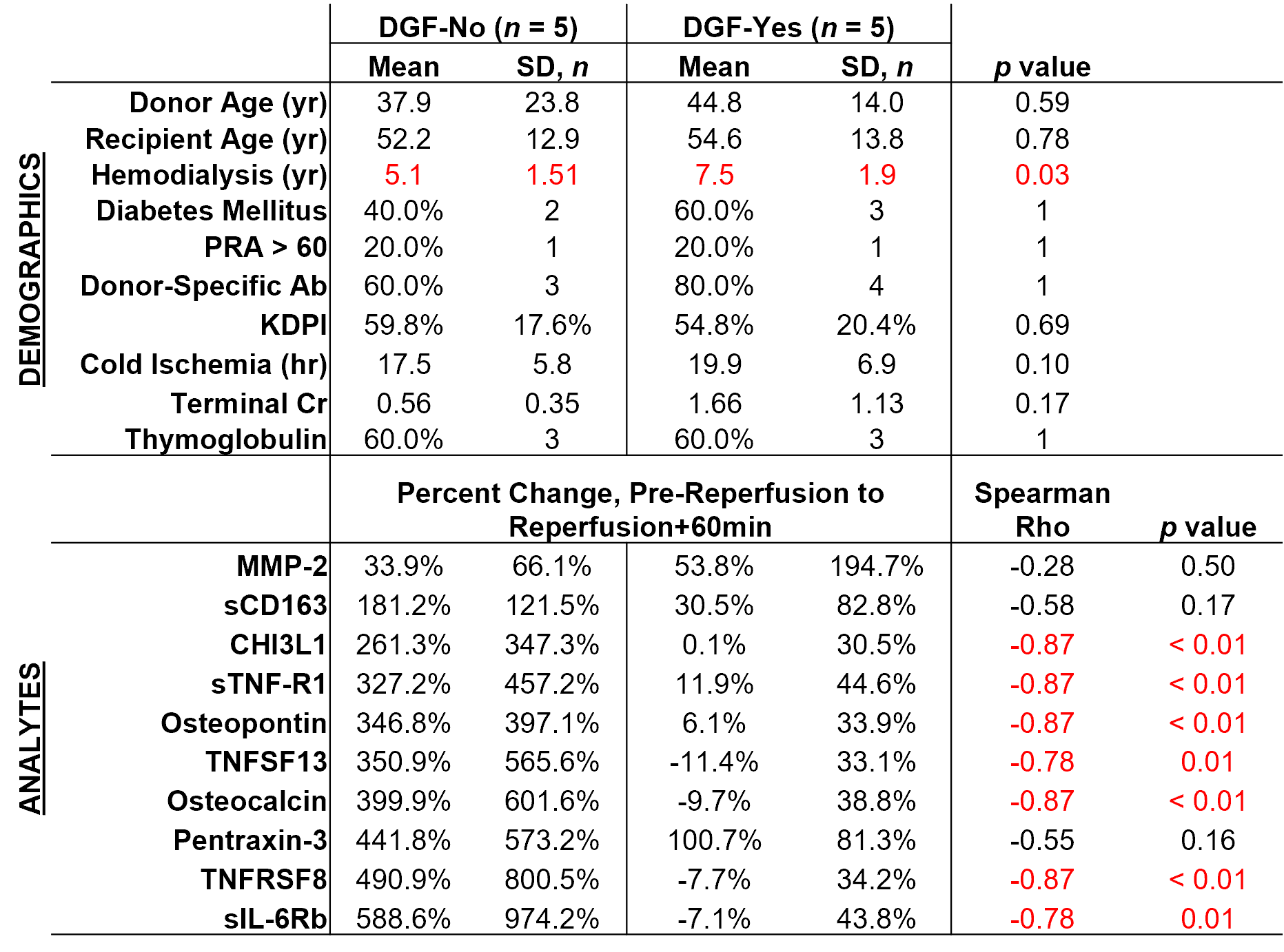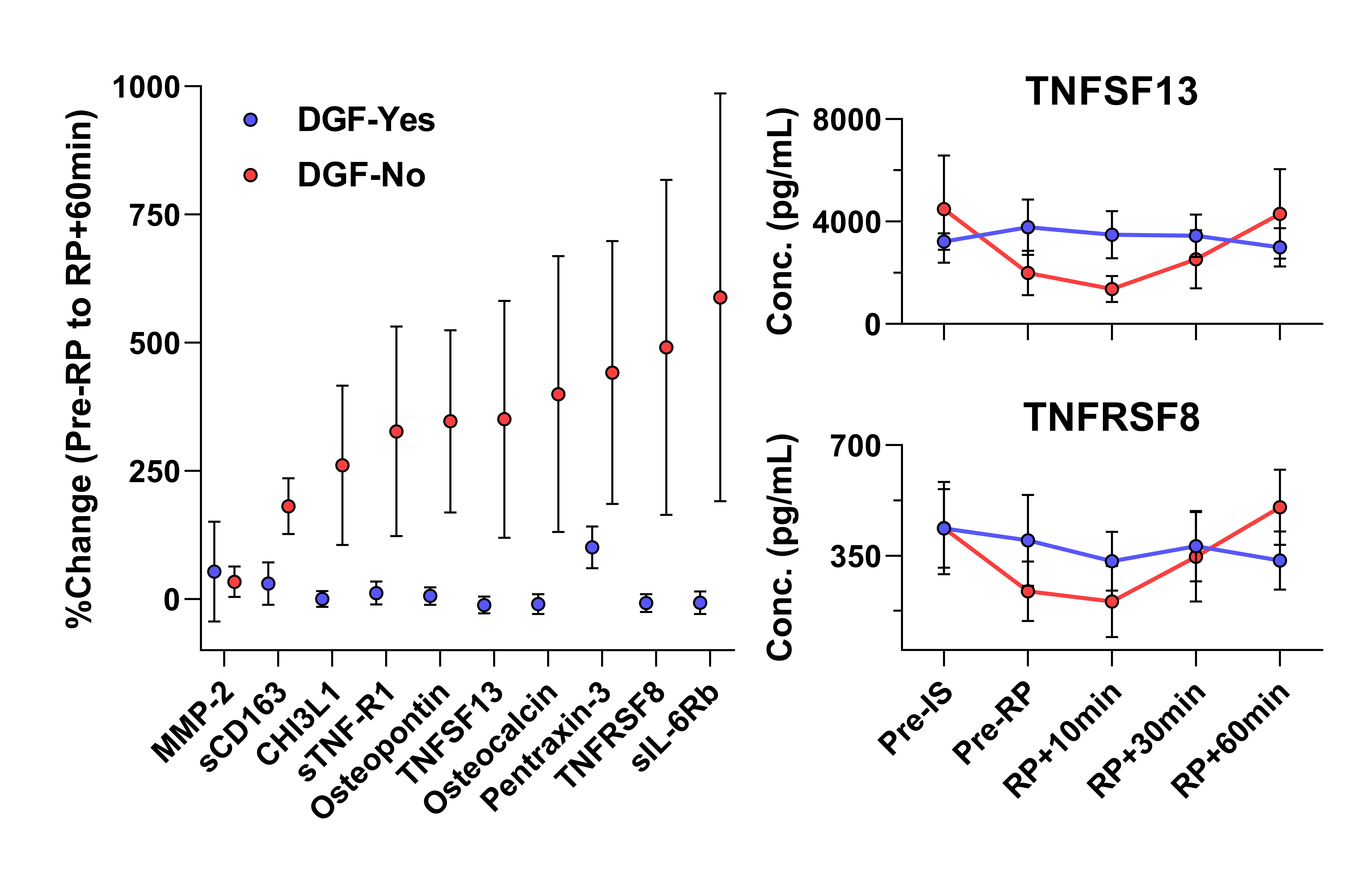Intraoperative Kinetics of Pro-Inflammatory Markers and Delayed-Graft Function During Kidney Transplantation
University of Texas Medical Branch, Galveston, TX
Meeting: 2022 American Transplant Congress
Abstract number: 417
Keywords: Graft function, Induction therapy, Inflammation, Kidney transplantation
Topic: Clinical Science » Kidney » 37 - Kidney Immunosuppression: Induction Therapy
Session Information
Session Name: Kidney Immunosuppression
Session Type: Rapid Fire Oral Abstract
Date: Tuesday, June 7, 2022
Session Time: 3:30pm-5:00pm
 Presentation Time: 4:50pm-5:00pm
Presentation Time: 4:50pm-5:00pm
Location: Hynes Room 302
*Purpose: Detailed molecular changes associated with allograft reperfusion have been poorly defined and current methods of predicting delayed graft function (DGF) after kidney transplantation are imperfect. In an effort to develop a biologically rooted prediction of DGF, we measured the intra-operative kinetics of inflammatory markers at clinically relevant timepoints.
*Methods: We quantified 37 key biomarkers (TNF superfamily proteins, IFN family proteins, Treg cytokines, and MMPs) in plasma at 5 intra-operative timepoints (pre-immunosuppression (pre-IS), immediately pre-reperfusion (pre-RP), and 10, 30, and 60 min post-reperfusion) in 10 deceased donor kidney recipients. As part of induction, all patients received methylprednisolone. Patients were grouped according to development of DGF (DGF-No, DGF-Yes).
*Results: With the exception of years on hemodialysis, patient demographics were similar between the two groups (Table 1). Representative intra-operative biomarker kinetics (TNFRSF8 and TNFSF13) are shown in Figure 1. Compared to DGF-Yes, patients in DGF-No tended to have a (non-significant) reduction in inflammatory marker concentration in response to induction immunosuppression. Likewise, there was a pronounced post-reperfusion rebound pattern in DGF-No. Increases in post-reperfusion levels of 7 markers (at 60 min) were significantly negatively correlated with the development of DGF.
*Conclusions: Despite similar starting and ending marker concentrations (pre-IS and 60 min post-reperfusion), the intra-operative kinetic differences in these inflammatory markers were significantly and strongly correlated with the development of DGF. Unexpectedly, the post-reperfusion increases in inflammatory markers were associated with immediate graft function. We suspect that response to induction IS, specifically steroids, as evidenced here by differential intra-operative kinetics of pro-inflammatory cytokines, may be involved in priming the innate immune system, influencing post-reperfusion graft function. Further investigation into the potential relationship between DGF and glucocorticoid gene suppression is warranted.
To cite this abstract in AMA style:
Wadsworth PA, Stevenson HL, Kueht ML. Intraoperative Kinetics of Pro-Inflammatory Markers and Delayed-Graft Function During Kidney Transplantation [abstract]. Am J Transplant. 2022; 22 (suppl 3). https://atcmeetingabstracts.com/abstract/intraoperative-kinetics-of-pro-inflammatory-markers-and-delayed-graft-function-during-kidney-transplantation/. Accessed February 15, 2026.« Back to 2022 American Transplant Congress


